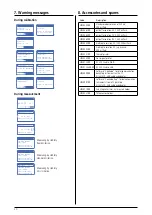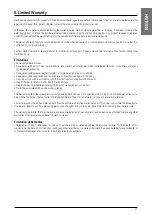
Technical Buffers
Use first buffer
Continue...
CALIBRATING pH
Technical Buffers
Use second buffer
Continue...
CALIBRATING pH
Technical Buffers
Use third buffer
Continue...
CALIBRATING pH
...
Start calibration
Technical buffers
1st buffer OK
pH 7.01 23˚C
00:30
CALIBRATING
1st buffer
pH
7.15 25˚C
00:23
CALIBRATING
1st buffer
pH
7.15 25˚C
Stirring
23%
00:23
CALIBRATING
2nd buffer
pH
4.12 23˚C
00:20
2nd buffer OK
pH 4.01 23˚C
00:26
CALIBRATING
1st buffer
pH 7.15
25˚C
00:23
10-04-2010 17:15
CALIBRATE pH
4. Operation
4.5. pH calibration
To measure pH correctly, the electrode and the instrument set
need to be calibrated regularly with buffer solutions . This
compensates deviations of asymmetry potential and slope of the
electrode over time .
The calibration with buffer solutions corrects variations in the
electrode response .
The instrument allows one-, two- and three- point calibration .
The calibration parameters remain in memory until a new calibra-
tion is performed .
The standard calibration is performed with technical buffers and
standard stability criterion . In addition, the instrument offers
other options for calibration .
It is highly recommended to apply the same stability criteria to
measure and calibrate .
One-point calibration
This type of calibration is acceptable when measuring pH values
similar to those of the buffer solution .
It corrects the asymmetry potential of the electrode .
Two-point calibration
This is the most common calibration .
It is recommended to start with pH 7 as first buffer . pH 4 or pH 9
buffers can be used as a second buffer, depending on the meas-
ured zone (acid or alkaline) .
The two-point calibration compensates the asymmetry potential
and the electrode’s sensitivity (slope) .
Three-point calibration
This type of calibration is recommended when measurements are
made across the whole pH scale .
As a first point pH 7 is recommended .
For the second and third points, two of the remaining values
must be chosen .
The three-point calibration pH 4 .00, 7 .01 and 9 .21 (at 25°C,
77°F) compensates the asymmetry potential and electrode’s
sensitivity in the acid and alkaline zone .
Calibration with technical buffers
Buffers pH 4 .00, 7 .01 and 9 .21 (at 25°C, 77°C) are supplied
together with the instrument .
Preparation
Fill the flasks with the corresponding buffer solution (40 ml) .
These buffers can be used to perform more than 10 calibrations .
Every calibration flask is supplied with a magnetic bar .
Diagram for calibration
8
Important note:
The pH value of the buffer appearing on the display depends on
the temperature of calibration . See buffers pH values as a func-
tion of the temperature on page 18 .
To modify the
standard calibra-
tion see page 9.
The instrument
controls automati-
cally the start/stop
of the stirrer.
Modify temperature
with
Modify stirring
with
Summary of Contents for sension ph31
Page 2: ......
Page 3: ...ENGLISH ESPA OL FRAN AIS PORTUGU S CONTACT...
Page 4: ......
Page 26: ......
Page 28: ......













































